To link in with Allegra’s thematic week on the #Body, we have put together the following curated list of the latest books relating to the Anthropology of #Food, highlighting some of the exciting work being done in this area of study.
We construct our bodies through the consumption and non-conception of food, a subject explored in Charlotte Biltekoff book, looking at ‘our obsession with diet as a proxy for health’. In the books on our list food is used as a means to explore a wide range of subjects, such as ideas around how what we eat shapes our identities: from migration in the Caribbean, to the importance of rice and community in Vietnam and inclusion/exclusion among the Garos of Assam. Other ethnographies focus on food movements and activism, linking in with Allegra’s on-going thread on #Sustainability; Fair Trade tea in India, ethical food in post socialist societies and the impact of globalisation on food consumption are just a few of the subjects covered.
One of the ethnography on the list looks at the slaughterhouse and the killing of non-human bodies and another one explores women’s agency in relation to food insecurity – so hopefully something for everyone! If you are interested in reviewing one of these books for us, please contact Allegra’s Editor, Judith Beyer, or Reviews assistant, Sophie Allies-Curtis, at reviews@allegralaboratory.net and we will send you a copy!
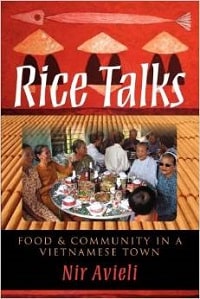 Avieli, Nir. 2012. Rice Talks: Food and Community in a Vietnamese Town. Bloomington: Indiana University Press. 336 pp. Pb: £15.99. ISBN: 9780253223708
Avieli, Nir. 2012. Rice Talks: Food and Community in a Vietnamese Town. Bloomington: Indiana University Press. 336 pp. Pb: £15.99. ISBN: 9780253223708
Rice Talks explores the importance of cooking and eating in the everyday social life of Hoi An, a prosperous market town in central Vietnam known for its exceptionally elaborate and sophisticated local cuisine. In a vivid and highly personal account, Nir Avieli takes the reader from the private setting of the extended family meal into the public realm of the festive, extraordinary, and unique. He shows how foodways relate to class relations, gender roles, religious practices, cosmology, ethnicity, and even local and national politics.
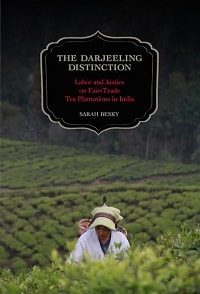 Besky, Sarah. 2013. The Darjeeling Distinction: Labor and Justice on Fair-trade Tea Plantations in India. Oakland: University of California Press. 264 pp. Pb: £19.95. ISBN: 9780520277397
Besky, Sarah. 2013. The Darjeeling Distinction: Labor and Justice on Fair-trade Tea Plantations in India. Oakland: University of California Press. 264 pp. Pb: £19.95. ISBN: 9780520277397
In this nuanced ethnography, Sarah Besky narrates the lives of tea workers in Darjeeling. She explores how notions of fairness, value, and justice shifted with the rise of fair-trade practices and postcolonial separatist politics in the region. The Darjeeling Distinction challenges fair-trade policy and practice, exposing how trade initiatives often fail to consider the larger environmental, historical, and sociopolitical forces that shape the lives of the people they intended to support.
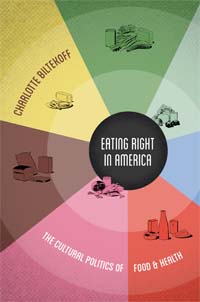 Biltekoff, Charlotte. 2013. Eating Right in America: The Cultural Politics of Food and Health. Durham:Duke University Press. 224 pp. Pb: £14.99. ISBN: 9780822355595
Biltekoff, Charlotte. 2013. Eating Right in America: The Cultural Politics of Food and Health. Durham:Duke University Press. 224 pp. Pb: £14.99. ISBN: 9780822355595
Eating Right in America is a powerful critique of dietary reform in the United States from the late nineteenth-century emergence of nutritional science through the contemporary alternative food movement and campaign against obesity. Charlotte Biltekoff shows that while the primary aim may be to improve health, the process of teaching people to “eat right” in the U.S. inevitably involves shaping certain kinds of subjects and citizens, and shoring up the identity and social boundaries of the ever-threatened American middle class. Without discounting the pleasures of food or the value of wellness, Biltekoff advocates a critical reappraisal of our obsession with diet as a proxy for health.
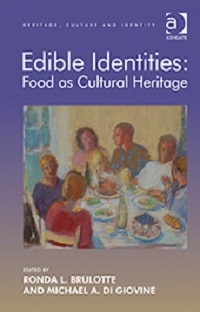 Brulotte, Ronda L. and Di Giovine, Michael A. 2014. Edible Identities: Food as Cultural Heritage. Farnham: Ashgate. 244 pp. Hb: £65.00. ISBN: 9781409442646
Brulotte, Ronda L. and Di Giovine, Michael A. 2014. Edible Identities: Food as Cultural Heritage. Farnham: Ashgate. 244 pp. Hb: £65.00. ISBN: 9781409442646
Food – its cultivation, preparation and communal consumption – has long been considered a form of cultural heritage. A dynamic, living product, food creates social bonds as it simultaneously marks off and maintains cultural difference. In bringing together anthropologists, historians and other scholars of food and heritage, this volume closely examines the ways in which the cultivation, preparation, and consumption of food is used to create identity claims of ‘cultural heritage’ on local, regional, national and international scales.
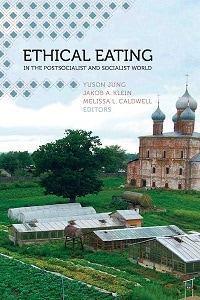 Caldwell, Melissa L., Klein, Jakob A. and Jung, Yuson (eds.) 2014. Ethical Eating in the Postsocialist and Socialist World. Oakland: University of California Press. 232 pp. Hb: $65.00. ISBN: 9780520277403
Caldwell, Melissa L., Klein, Jakob A. and Jung, Yuson (eds.) 2014. Ethical Eating in the Postsocialist and Socialist World. Oakland: University of California Press. 232 pp. Hb: $65.00. ISBN: 9780520277403
Current discussions of the ethics around alternative food movements–concepts such as “local,” “organic,” and “fair trade”–tend to focus on their growth and significance in advanced capitalist societies. In this groundbreaking contribution to critical food studies, editors Yuson Jung, Jakob A. Klein, and Melissa L. Caldwell explore what constitutes “ethical food” and “ethical eating” in socialist and formerly socialist societies. With essays by anthropologists, sociologists, and geographers, this politically nuanced volume offers insight into the origins of alternative food movements and their place in today’s global economy.
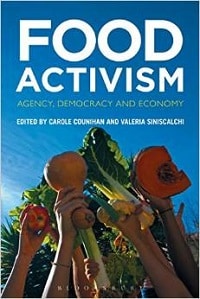 Counihan, Carole and Siniscalchi, Valeria. 2013. Food Activism: Agency, Democracy and Economy. London: Bloomsbury Academic. 264 pp. Pb: £17.99. ISBN: 9780857858337
Counihan, Carole and Siniscalchi, Valeria. 2013. Food Activism: Agency, Democracy and Economy. London: Bloomsbury Academic. 264 pp. Pb: £17.99. ISBN: 9780857858337
Across the globe, people are challenging the agro-industrial food system and its exploitation of people and resources, reduction of local food varieties, and negative health consequences. In this collection leading international anthropologists explore food activism across the globe to show how people speak to, negotiate, or cope with power through food. Who are the actors of food activism and what forms of agency do they enact? What kinds of economy, exchanges, and market relations do they practice and promote? How are they organized and what are their scales of political action and power relations?
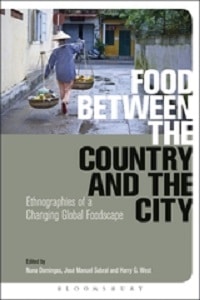 Domingos, Nuno Miguel, Sobral, Jose Manuel and West, Harry G. (eds.). 2014. Food Between the Country and the City: Ethnographies of a Changing Global Foodscape. London: Bloomsbury Academic. 264 pp. Pb: £22.49. ISBN: 9780857855381
Domingos, Nuno Miguel, Sobral, Jose Manuel and West, Harry G. (eds.). 2014. Food Between the Country and the City: Ethnographies of a Changing Global Foodscape. London: Bloomsbury Academic. 264 pp. Pb: £22.49. ISBN: 9780857855381
At a time when the relationship between ‘the country’ and ‘the city’ is in flux worldwide, the value and meanings of food associated with both places continue to be debated. Building upon the foundation of Raymond Williams’ classic work, The Country and the City, this volume examines how conceptions of the country and the city invoked in relation to food not only reflect their changing relationship but have also been used to alter the very dynamics through which countryside and cities, and the food grown and eaten within them, are produced and sustained.
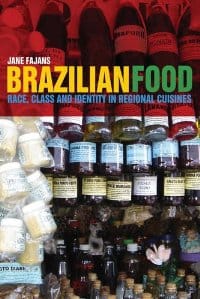 Fajans, Jane. 2012. Brazilian Food: Race, Class and Identity in Regional Cuisines. Oxford: Berg Publishers. 160 pp. Pb: 17.99. ISBN: 9780857850423
Fajans, Jane. 2012. Brazilian Food: Race, Class and Identity in Regional Cuisines. Oxford: Berg Publishers. 160 pp. Pb: 17.99. ISBN: 9780857850423
Brazil is a nation of vast expanses and enormous variation from geography and climate to cultures and languages. Within these boundaries are definable regions in which certain customs, history, and shared views help define an identity and cohesion. This book… explores the way in which food has become an important element in attracting tourists to a region as well as a way of making aspects of a culture known beyond its borders as cookbooks, ingredients and restaurants move outward in our globalized world.
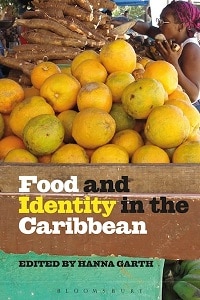 Garth, Hanna. 2013. Food and Identity in the Caribbean. London: Bloomsbury Academic 192 pp. Pb: £17.99. ISBN:9780857853592
Garth, Hanna. 2013. Food and Identity in the Caribbean. London: Bloomsbury Academic 192 pp. Pb: £17.99. ISBN:9780857853592
This compelling volume brings together original essays that explore the relationship between food and identity in everyday life in the Caribbean. The Caribbean history of colonialism and migration has fostered a dynamic and diverse form of modernity, which continues to transform with the impact of globalization and migration out of the Caribbean. Based on rich contemporary ethnographies, the volume reveals the ways in which food carries symbolic meanings, which are incorporated into the many different facets of identity experienced by people in the Caribbean.
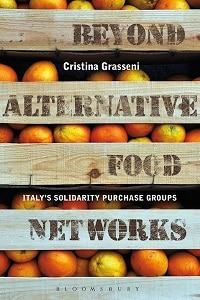 Grasseni, Cristina. 2013. Beyond Alternative Food Networks: Italy’s Solidarity Purchase Groups. London: Bloomsbury Academic. 224 pp. Pb: £55.00. ISBN: 9780857852274
Grasseni, Cristina. 2013. Beyond Alternative Food Networks: Italy’s Solidarity Purchase Groups. London: Bloomsbury Academic. 224 pp. Pb: £55.00. ISBN: 9780857852274
Food activism is core to the contemporary study of food – there are numerous foodscapes which exist within the umbrella definition of food activism from farmer’s markets, organic food movements to Fair Trade. This highly original book focuses on one key emerging foodscape dominating the Italian alternative food network (AFN) scene: GAS (gruppi di acquisto solidale or solidarity-based purchase groups) and explores the innovative social dynamics underlying these networks and the reasons behind their success. Beyond Alternative Food Networks provides original insight and in-depth analysis of the alternative food network now thriving in Italy, and highlights ways such networks become embedded in active citizenship practices, cooperative relationships, and social networks.
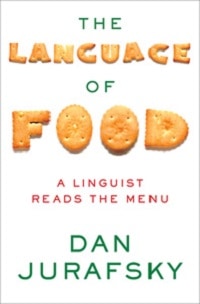 Jurafsky, Dan. 2014. The Language of Food: A Linguist Reads the Menu. New York: W. W. Norton & Company. 272pp. Hb: $26.95. ISBN: 9780393240832
Jurafsky, Dan. 2014. The Language of Food: A Linguist Reads the Menu. New York: W. W. Norton & Company. 272pp. Hb: $26.95. ISBN: 9780393240832
In The Language of Food, Stanford University professor and MacArthur Fellow Dan Jurafsky peels away the mysteries from the foods we think we know. Jurafsky points out the subtle meanings hidden in filler words like “rich” and “crispy,” zeroes in on the metaphors and storytelling tropes we rely on in restaurant reviews, and charts a microuniverse of marketing language on the back of a bag of potato chips. From ancient recipes preserved in Sumerian song lyrics to colonial shipping routes that first connected East and West, Jurafsky paints a vibrant portrait of how our foods developed.
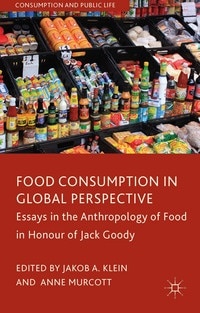 Klein, Jakob A. and Murcott, Anne (eds.). 2014. Food Consumption in Global Perspective: Essays in the Anthropology of Food in Honour of Jack Goody. New York: Palgrave Macmillan. 240 pp. Hb: $105.00. ISBN: 9781137326409
Klein, Jakob A. and Murcott, Anne (eds.). 2014. Food Consumption in Global Perspective: Essays in the Anthropology of Food in Honour of Jack Goody. New York: Palgrave Macmillan. 240 pp. Hb: $105.00. ISBN: 9781137326409
The globalization of food consumption has often been equated with the loss of culinary traditions and the homogenization of cuisines. By contrast, the anthropologists, historians and sociologists contributing to this collection reveal both rapid changes and also profound and sometimes surprising continuities in local food consumption practices in the nineteenth, twentieth and twenty-first centuries, and use these to shed light on shifting social boundaries and cultural identities. The volume combines ethnographic, historical and comparative analyses, situating local practices of eating, cooking and sharing food within transnational processes and contexts.
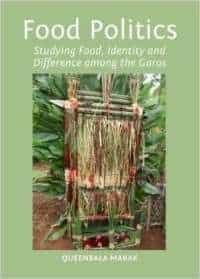 Marak, Queenbala. 2014. Food Politics: Studying Food, Identity and Difference among the Garos. Newcastle upon Tyne: Cambridge Scholars Publishing. 210 pp. Hb: £44.00. ISBN: 9781443857109
Marak, Queenbala. 2014. Food Politics: Studying Food, Identity and Difference among the Garos. Newcastle upon Tyne: Cambridge Scholars Publishing. 210 pp. Hb: £44.00. ISBN: 9781443857109
This ethnographic work discusses the politics inherent in food among the Garos of Assam (India) and Bangladesh. In these two areas, they live as a minority, and with and in the peripheries of a dominant non-Garo culture. Thus, this book examines the ways in which Garos conceptualize themselves and the ‘other’ world through the microcosm of food – the most important need of all. It discusses, among other topics, how the concepts of Garo food versus non-Garo food find fruition in social reality and collective memory, as an identity marker.
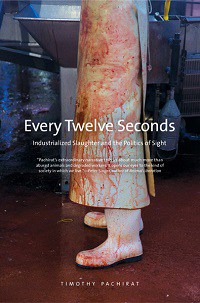 Pachirat, Timothy. 2013. Every Twelve Seconds: Industrialized Slaughter and the Politics of Sight. New Haven: Yale University Press. 320 pp. Pb: $22.00. ISBN: 9780300192483.
Pachirat, Timothy. 2013. Every Twelve Seconds: Industrialized Slaughter and the Politics of Sight. New Haven: Yale University Press. 320 pp. Pb: $22.00. ISBN: 9780300192483.
This is an account of industrialized killing from a participant’s point of view. The author, political scientist Timothy Pachirat, was employed undercover for five months in a Great Plains slaughterhouse where 2,500 cattle were killed per day—one every twelve seconds. With much to say about issues ranging from the sociology of violence and modern food production to animal rights and welfare, Every Twelve Seconds is an important and disturbing work.
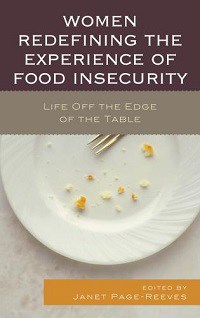 Page-Reeves, Janet (ed.). 2014. Women Redefining the Experience of Food Insecurity: Life off the Edge of the Table. New York: Lexington Books. 346 pp. Hb: $100.00. ISBN: 9780739185261
Page-Reeves, Janet (ed.). 2014. Women Redefining the Experience of Food Insecurity: Life off the Edge of the Table. New York: Lexington Books. 346 pp. Hb: $100.00. ISBN: 9780739185261
Women Redefining the Experience of Food Insecurity: Life Off the Edge of the Table is about understanding the relationship between food insecurity and women’s agency. The contributors explore both the structural constraints that limit what and how much people eat, and the myriad ways that women creatively and strategically re-structure their own fields of action in relation to food, demonstrating that the nature of food insecurity is multi-dimensional. The authors… explore the contradictions inherent in the ways that marginalized, seemingly powerless women ignore, resist, embrace and challenge hegemonic, patriarchal systems through their relationship with food.
If you are interested in reviewing one of these books, please inform Allegra’s review editor Judith Beyer @ reviews@allegralaboratory.net . Here are our review guidelines:
Spelling: British English. Please use –ise and not –ize word endings.
Word limit: 750-1500 words
Font: Times New Roman
Size: 12
Line Spacing: 1,5
No footnotes.
If you cite other authors, please reference their publication in the end.
The review is to be written within three months from the dispatch of the book.
Please also include your name and (academic) affiliation.

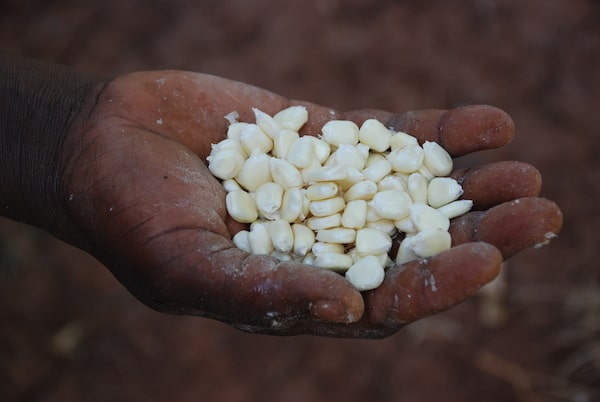

I would like to review Sarah Besky’s book on tea.
My research focuses on expressions and conceptualisations of cultural heritage, therefore I would be interested in writing a review of the book ‘Edible Entities. Food as Cultural Heritage’ by Brulotte, Ronda L. and Di Giovine, Michael A.
Best regards,
Maria
I do research on other sides of development, mainly the views from participants, and I’d gladly review the book from Mr. Pachirat, Timothy. 2013. Every Twelve Seconds: Industrialized Slaughter and the Politics of Sight.
I can do Food between country and city and the volume in honour of J Goody.
Dear everyone, thank you for your interest in reviews. Please contact Judith Beyer, Allegra’s reviews editor (reviews@allegralaboratory.net) and she will make sure that you receive a copy of the book!
I can review the following:
Women Redefining the Experience of Food Insecurity and Food Consumption in a Global Perspective.
I have worked in development, greatly interested in food security issues, gender, and globalization.